人教版(新课程标准)必修1 Unit 3 Travel journal Using language精品课件(39张ppt)
文档属性
| 名称 | 人教版(新课程标准)必修1 Unit 3 Travel journal Using language精品课件(39张ppt) |
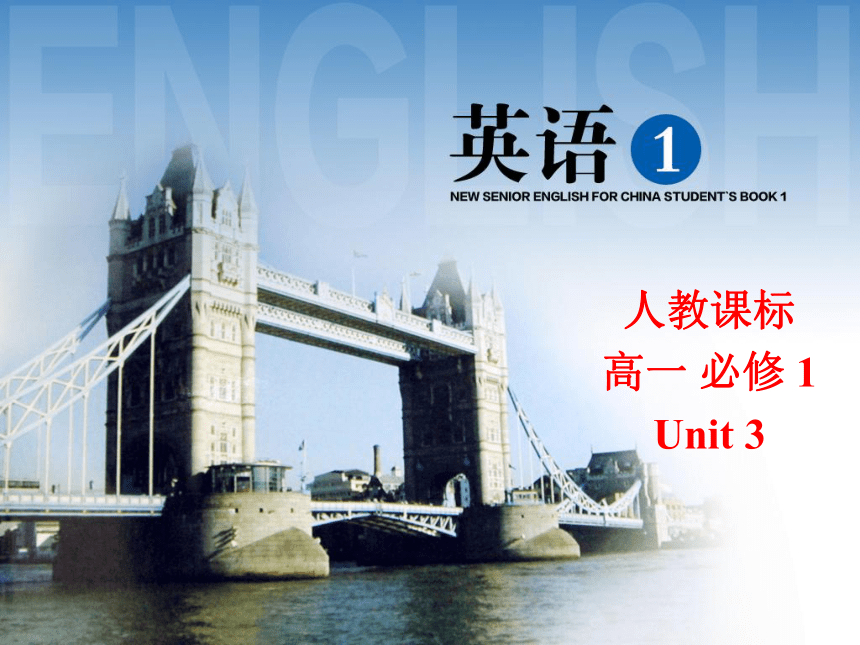
|
|
| 格式 | ppt | ||
| 文件大小 | 8.3MB | ||
| 资源类型 | 教案 | ||
| 版本资源 | 人教版(新课程标准) | ||
| 科目 | 英语 | ||
| 更新时间 | 2022-01-22 12:36:45 | ||
图片预览


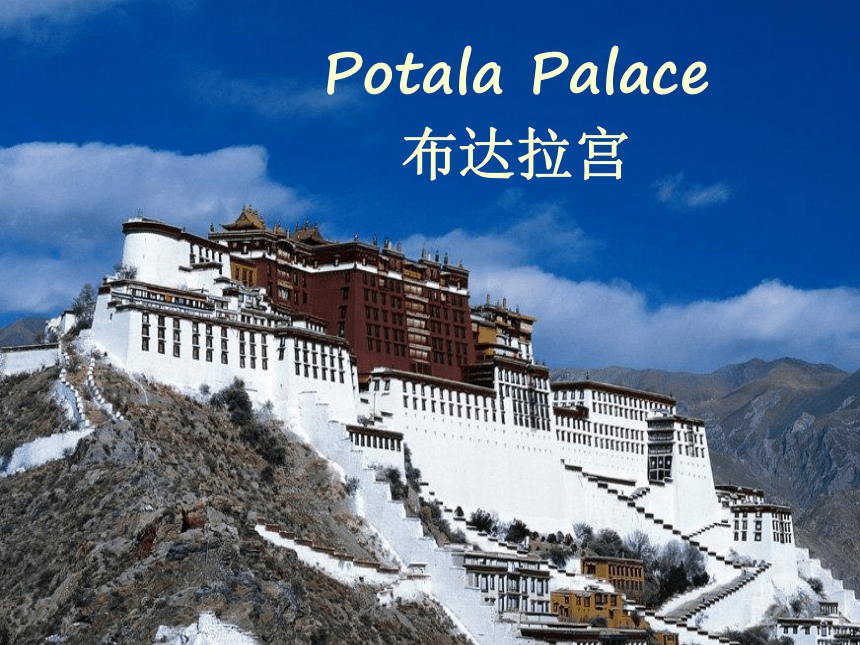
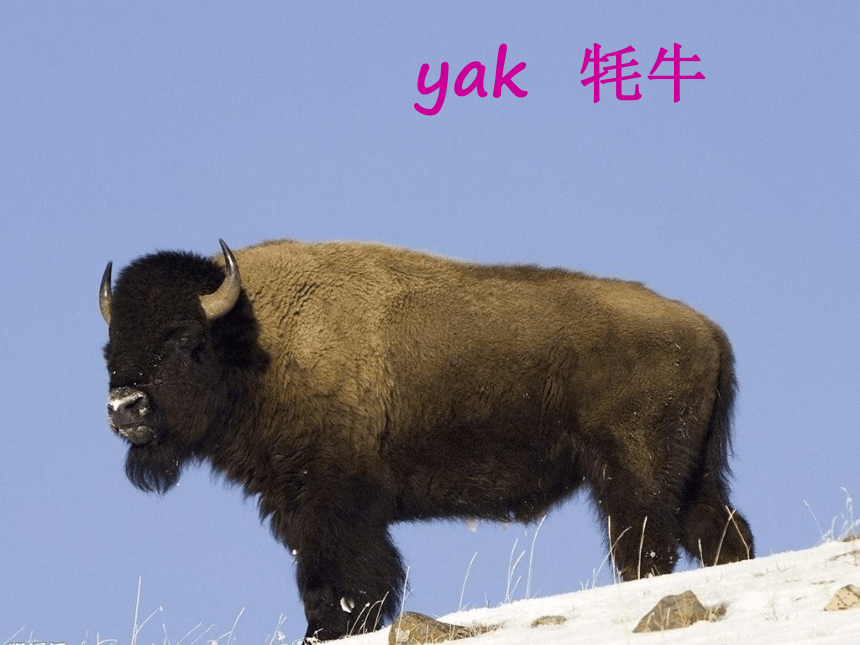

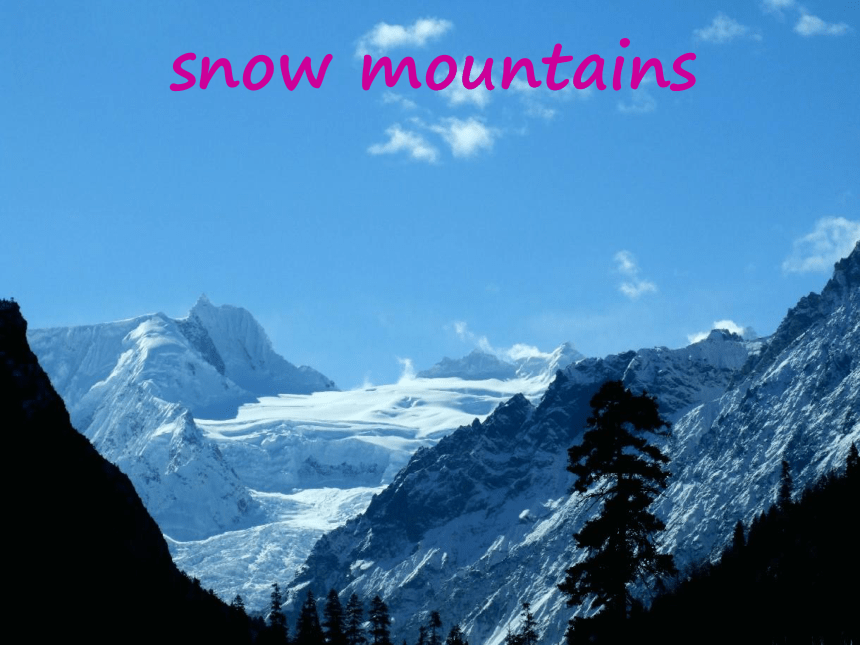

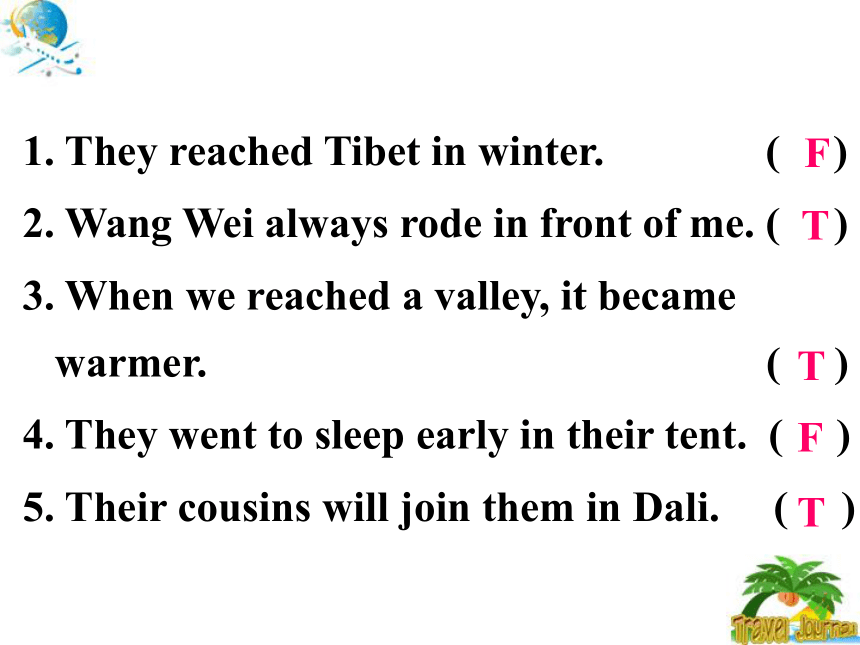


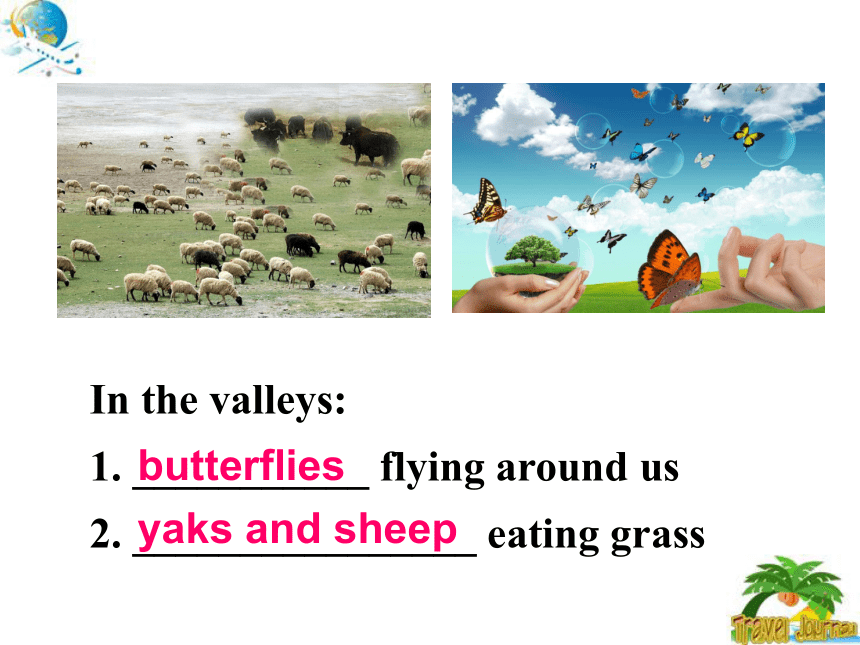

文档简介
(共39张PPT)
人教课标
高一 必修 1
Unit 3
Journey down the Mekong
PART 2 A NIGHT IN THE MOUNTAINS
Have you ever been to Tibet
Potala Palace
布达拉宫
yak 牦牛
sheep
snow mountains
They reached Tibet in winter. ( )
Wang Wei always rode in front of me. ( )
3. When we reached a valley, it became warmer. ( )
4. They went to sleep early in their tent. ( )
5. Their cousins will join them in Dali. ( )
F
T
T
F
T
On the mountain they saw:
_________________
2. _________________
3. _________________
snowfall
clear sky
bright stars
In the valleys:
___________ flying around us
2. ________________ eating grass
butterflies
yaks and sheep
At midnight, they heard no sound of ______ but that of _____.
wind
fire
What did they do
1. _________ in the snow.
2. change _______ clothes for
___________ clothes.
3. _________ tent to make camp.
ride bike
winter
summer
put up
1. Legs were ________________.
2. To climb the mountain was ___________ but to go down the hills is great _____.
3. We can ___________ to see our cousins.
How did they feel
heavy and cold
hard work
fun
hardly wait
What items are Wang Kun and Wang Wei carrying with them What do you think they will have to leave behind in Dali What should they take instead
How does Wang Kun feel about the trip now What do you think has changed his mind
Wang Kun and Wang Wei are carrying a tent, a cooker and food, pillows, water bottles. In the mountains they wore long wool coats, caps, gloves and trousers. In the plains they changed into T-shirts and shorts.
1. What items are Wang Kun and Wang Wei carrying with them What do you think they will have to leave behind in Dali What should they take instead
2. How does Wang Kung feel about the trip now
He is starting to like/enjoy it. Seeing how beautiful the land is has changed Wang Kun’s attitude.
Imagine that in the morning there is a dialogue between Wang Kun and Wang Wei. What do you think they would say before they leave camp
A: You looked tired.
B: Yes, I stayed up the whole night.
A: Really
B: Yes, I watched the stars and the clear sky.
A: Great! That must be pretty.
B: Yes, they were. Look at the sun and the clouds.
A: How nice!
这时,我们不得不把帽子, 外套,手套和长裤脱掉,换成T恤衫和短裤。
1. At this point we had to change our caps, coats, gloves and trousers for T-shirts and shorts.
e.g. Wait, it won’t take me long to change.
change 换衣, 更换
get changed
换好衣服
change
零钱
change A for B 用A换B
Sara, hurry up. I’m afraid you won’t have time to ______ before the party.
get changed B. get change
C. get changing D. get to change
2. We put up our tents and then we eat.
我们先搭起帐篷然后吃饭。
put up
① 举起, 抬起 = raise
② 挂起, 张贴
③ 建造, 搭起 = build
④ 住宿, 留宿
e.g. He put up his
hand to catch
the teacher’s
attention.
A new notice has been put up on the board.
A new theatre will be put up where there used to be a temple.
Will you put me up for the night
put away 把……收起来, 存放
put back 放回原处
put down 放下, 写下, 镇压
put forward 提出
put off 推迟, 拖延
put out 扑灭, 伸出
put one’s heart to 全神贯注于
put an end to 使结束
3. We can hardly wait to see them!
我们迫不及待地想看一看。
can (could) hardly (not) wait to do
迫不及待地去做某事
I must be getting fat — I can ______ do my trousers up.
A. fairly B. hardly
C. nearly D. seldom
Listening and speaking
Can you imagine what happened when Wang Kun and Wang Wei travelled down the Mekong river
What happened
see some beautiful sceneries
meet some thing dangerous
get lost
chatting with the passers-by
…….
1. Before you listen, read the exersises on Page 23 and predict what the listening is about.
2. Listen to the tape and tick the
statement which tells the main idea of the dialogue.
A A girl from Laos told Wang Kun
about how Laotians use the Mekong
River.
B A girl told Wang Kun about what they
would see along the Mekong River.
C A girl from Laos told Wang Kun
about how important and beautiful
the Mekong is.
3. Listen again and complete the passage below.
The Mekong is the most important river in Laos. It even _______ on the national ____ of the country. Laotian people use the river for _______, _______ and ___________ goods and people around the country. They call the Mekong
appears
flag
washing
fishing
transporting
“the ____ of Laos”, but in Tibet people call it “the water of _______”. If you follow the river in Laos, you can visit temples, caves and a _________. At night, you can sleep in some small _______ by the river.
sea
rocks
waterfall
villages
人教课标
高一 必修 1
Unit 3
Journey down the Mekong
PART 2 A NIGHT IN THE MOUNTAINS
Have you ever been to Tibet
Potala Palace
布达拉宫
yak 牦牛
sheep
snow mountains
They reached Tibet in winter. ( )
Wang Wei always rode in front of me. ( )
3. When we reached a valley, it became warmer. ( )
4. They went to sleep early in their tent. ( )
5. Their cousins will join them in Dali. ( )
F
T
T
F
T
On the mountain they saw:
_________________
2. _________________
3. _________________
snowfall
clear sky
bright stars
In the valleys:
___________ flying around us
2. ________________ eating grass
butterflies
yaks and sheep
At midnight, they heard no sound of ______ but that of _____.
wind
fire
What did they do
1. _________ in the snow.
2. change _______ clothes for
___________ clothes.
3. _________ tent to make camp.
ride bike
winter
summer
put up
1. Legs were ________________.
2. To climb the mountain was ___________ but to go down the hills is great _____.
3. We can ___________ to see our cousins.
How did they feel
heavy and cold
hard work
fun
hardly wait
What items are Wang Kun and Wang Wei carrying with them What do you think they will have to leave behind in Dali What should they take instead
How does Wang Kun feel about the trip now What do you think has changed his mind
Wang Kun and Wang Wei are carrying a tent, a cooker and food, pillows, water bottles. In the mountains they wore long wool coats, caps, gloves and trousers. In the plains they changed into T-shirts and shorts.
1. What items are Wang Kun and Wang Wei carrying with them What do you think they will have to leave behind in Dali What should they take instead
2. How does Wang Kung feel about the trip now
He is starting to like/enjoy it. Seeing how beautiful the land is has changed Wang Kun’s attitude.
Imagine that in the morning there is a dialogue between Wang Kun and Wang Wei. What do you think they would say before they leave camp
A: You looked tired.
B: Yes, I stayed up the whole night.
A: Really
B: Yes, I watched the stars and the clear sky.
A: Great! That must be pretty.
B: Yes, they were. Look at the sun and the clouds.
A: How nice!
这时,我们不得不把帽子, 外套,手套和长裤脱掉,换成T恤衫和短裤。
1. At this point we had to change our caps, coats, gloves and trousers for T-shirts and shorts.
e.g. Wait, it won’t take me long to change.
change 换衣, 更换
get changed
换好衣服
change
零钱
change A for B 用A换B
Sara, hurry up. I’m afraid you won’t have time to ______ before the party.
get changed B. get change
C. get changing D. get to change
2. We put up our tents and then we eat.
我们先搭起帐篷然后吃饭。
put up
① 举起, 抬起 = raise
② 挂起, 张贴
③ 建造, 搭起 = build
④ 住宿, 留宿
e.g. He put up his
hand to catch
the teacher’s
attention.
A new notice has been put up on the board.
A new theatre will be put up where there used to be a temple.
Will you put me up for the night
put away 把……收起来, 存放
put back 放回原处
put down 放下, 写下, 镇压
put forward 提出
put off 推迟, 拖延
put out 扑灭, 伸出
put one’s heart to 全神贯注于
put an end to 使结束
3. We can hardly wait to see them!
我们迫不及待地想看一看。
can (could) hardly (not) wait to do
迫不及待地去做某事
I must be getting fat — I can ______ do my trousers up.
A. fairly B. hardly
C. nearly D. seldom
Listening and speaking
Can you imagine what happened when Wang Kun and Wang Wei travelled down the Mekong river
What happened
see some beautiful sceneries
meet some thing dangerous
get lost
chatting with the passers-by
…….
1. Before you listen, read the exersises on Page 23 and predict what the listening is about.
2. Listen to the tape and tick the
statement which tells the main idea of the dialogue.
A A girl from Laos told Wang Kun
about how Laotians use the Mekong
River.
B A girl told Wang Kun about what they
would see along the Mekong River.
C A girl from Laos told Wang Kun
about how important and beautiful
the Mekong is.
3. Listen again and complete the passage below.
The Mekong is the most important river in Laos. It even _______ on the national ____ of the country. Laotian people use the river for _______, _______ and ___________ goods and people around the country. They call the Mekong
appears
flag
washing
fishing
transporting
“the ____ of Laos”, but in Tibet people call it “the water of _______”. If you follow the river in Laos, you can visit temples, caves and a _________. At night, you can sleep in some small _______ by the river.
sea
rocks
waterfall
villages
